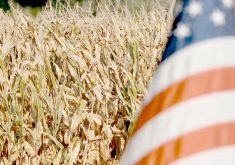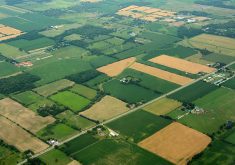Trade minister Stockwell Day says he hopes Canada’s decision to take the United States to international trade court over its country-of-origin labelling rules leads to negotiations to quickly end the dispute.
“I hope this gets their attention,” he said in an Oct. 8 interview after a Parliament Hill appearance. “A negotiated settlement always is the preferred route.”
On Oct. 7, Ottawa announced that it will request a World Trade Organization dispute settlement panel on COOL at an Oct. 23 meeting in Geneva.
Read Also

Gene editing digs deeper space in Canadian plant breeding
More Canadian research into crop variety development is incorporating gene editing, and one researcher notes that Canada’s regulatory approach to gene editing will help drive innovation
An expected American veto of the first request likely means the panel will not be established until a Nov. 20 meeting. The Canadian Cattlemen’s Association estimates that with hearings, possible appeals and other potential delays, a WTO ruling could come in mid-2010 with final implementation by mid-2011.
“The WTO process will take a long time but the CCA believes there is no other option,” the association said in an Oct. 7 statement. It estimated that COOL has cost the cattle industry $250 million during the past year in lower prices and increased costs.
Canadian Pork Council president Jurgen Preugschas also praised the announcement.
“Country-of-origin labelling has been a major factor why many Canadian producers are having to exit the hog industry and has cost the pork industry many millions of dollars,” he said Oct. 7.
Day’s hope for an agreement by the U.S. to negotiate a settlement could reduce the time and cost of resolving the issue.
Agriculture minister Gerry Ritz said in an interview Oct. 7 the government reached the “tipping point” in deciding to formally challenge the American rule after talks with U.S. officials failed and Canadian industry provided evidence that the COOL is costing money and U.S. market share.
“I’m still hopeful we can work it out with the U.S. but meanwhile, we will use the WTO tools available to pursue this,” he said in Ottawa. “I am confident we will win.”
In Washington, U.S. agriculture secretary Tom Vilsack and trade representative Ron Kirk issued a statement regretting the Canadian challenge and hoping for a negotiated “amicable” settlement.
But they insisted the requirement that country-of-origin labelling identify where the animal came from is legal and common.
“We believe that our implementation of COOL provides information to consumers consistent with our WTO commitments,” they said. “Countries have agreed since long before the existence of the WTO that country of origin labelling is a legitimate policy. It is common for other countries to require that goods be labelled as to their origin.”
The National Cattlemen’s Beef Association, a U.S. organization that opposes COOL rules, called the Canadian action an “unfortunate” indication of the problems with COOL. Canadian officials said it may be possible to have U.S. industry groups like NCBA as allies in the WTO fight.
“It’s becoming clear that COOL has damaged these critically important trading relationships (with Canada and Mexico) and is not putting any additional money into the pockets of cattlemen,” it said in a statement.
The American group R-CALF, which has lobbied for more U.S. trade protections, said U.S. agencies were right to take steps to curtail imports from Canada.
“This action by Canada should give considerable pause to those elected officials who have unwittingly transferred our sovereign right of self-government to an international tribunal,” R-CALF said in a statement after the Canadian decision was announced. The American government should do what it can to “quash” Canada’s complaint.
Canadian officials tried several times to negotiate a truce with the Americans to no avail.
The Canadian gripe with the American rule is that it requires label verification of where the animal was born and not just the country where the carcass was processed into meat products, usually the U.S.
CCA president Brad Wildeman said in the statement that American consumers have no problem buying Canadian-labelled product.
But importers and packers often avoid Canadian animals or price-discount them because of the extra cost in labelling or segregating American and Canadian-born animals in the slaughter and processing plants.
“There is both a hit on sales and some price discounting,” said Ritz.
In addition, the U.S. administration has not said if new tougher rules will become mandatory this autumn and that creates market uncertainty.














